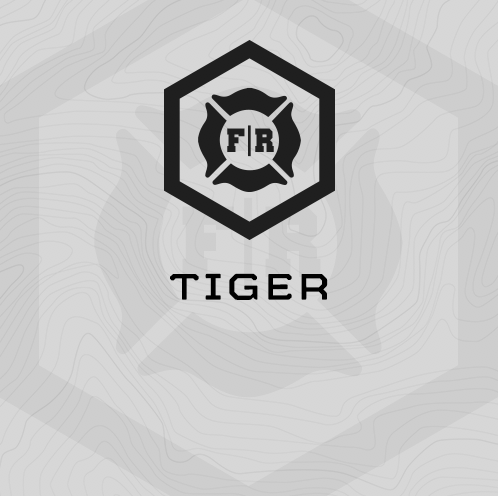Description
Tiger deploys our most recent Base Fitness programming theory for Fire/Rescue Athletes and is the fifth and final plan in the Big Cat Packet of plans for F/R Athletes. This programming is designed to meet the day-to-day fitness demands of full time Fire/Rescue personnel:
- Strength
- Multi-Modal Work Capacity
- Chassis Integrity (Functional Core) & Grip Strength
- Tactical Agility
Tiger is a, 7 week, 4 session/week (28 Total Training Sessions) and has a slight strength and work capacity emphasis. The plan also trains chassis integrity and Tactical Agility
This is Version 2 of this training plan, updated November, 2020.
PROGRAMMING SPECIFICS
Strength
With Tiger we deploy our Big 24 strength programming methodology built around the Push Press and In-Place Lunge. The cycle begins with a strength assessment, and utilizes those results for follow on progressions. You’ll complete a mid-cycle and final strength assessment to track progress and ensure your progression numbers are accurate.
Work Capacity
Tiger trains work capacity 2x/week alternating between 20-minute AMRAP efforts of loaded step ups and 25m shuttles, hard 5-minute repeats of sledge hits on a tire and burpees, and paced 4-5 minute interval repeats of dumbbell/kettlebell 1-Arm Clean + Push Presses or snatches.
Tactical Agility
Agility drills with level changes and shuttles/Sprints.
Chassis Integrity
Just one time a week this cycle. We’ve integrated Grip Strength into Chassis Integrity for this cycle, with timed farmers carries and plate pinch carries.
WEEKLY SCHEDULE
- Day 1: Density Strength, Work Capacity (step up/shuttle AMRAP)
- Day 2: TAC SEPA, Work Capacity (Sledge Hit/Burpee Intervals)
- Day 3: Strength, Chassis Integrity
- Day 4: TAC SEPA, Work Capacity (1-Arm Clean + Push Press/Snatch Intervals)
Given the work scheduling differences amongst firefighters and other fire/rescue athletes, this training plan does not assign training days (Monday, Tuesday, etc.) but rather lists 4 training sessions per week and leaves it up to the individual athlete to schedule his/her fitness training. In general, we recommend Fire/Rescue Athletes train at their fire or duty stations as much as possible possible. For a 24 hours shift, we specifically recommend you train early in the morning the day your shift begins, and again early in the morning the day your shift ends. Why? So others can see you training, and see that it can be done. As well, training during these times will help limit your work-specific training to the work place, and help address the burden of constant fitness over the course of your career.
Ideally, you’ll complete 4 trainings sessions per week. Obviously this is dependent on your unit’s duty schedule.
REQUIRED EQUIPMENT
- Barbell, Rack, Plates and/or a Full set of Dumbbells or Kettlebells
- Sandbags (40/60/80 Pound)
- Flat Bench
- Bench/Box for Step Ups
- Parking Lot/Open Garage Bay for Sprints
- Old Backpack
- Foam Roller
*** Note: Many of the weight training exercises in the plan can be completed with either a barbell and plates, or dumbbells/kettlebells. For example, if the session calls for power cleans, and your station doesn’t have a barbell/plates, you can substitute dumbbells and/or kettlebells and complete the dumbbell/kettlebell versions of the exercises. Be resourceful.
COMMON QUESTIONS
How long with the Training Sessions take?
The training sessions are designed to be completed in 60 minutes.
What does “4/8x” mean? How about “15/25#”?
The first number is for women, second is for men, both for reps, and loading. Examples:
4/8x Chin Ups = Women do 4x, Men do 8x
15/25# = Women use 15# (pounds), Men use 25# (pounds)
What Equipment is Required?
- Barbell, Rack, Plates and/or a Full set of Dumbbells or Kettlebells
- Sandbags (40/60/80 Pound)
- Flat Bench
- Bench/Box for Step Ups
- Parking Lot/Open Garage Bay for Sprints
- Old Backpack
- Foam Roller
What if I miss a training day?
Ideally, you will train 4 days per week, and take 3 full days off for rest or active recovery. If for some reason miss a session, do not skip ahead. Start again where you left off and complete the sessions in order throughout the plan.
The programming is progressive – it builds upon itself – and the training sessions are designed to be completed in order.
Where do I find unfamiliar exercises?
See our Exercise Library HERE.
What about nutrition?
See our Nutritional Guidelines HERE.
Can I see sample training?
Click the “Sample Training” tab to see the entire first week of programming.
How do I access the plan?
Access is online, via username and password. You can log in either through our website or through our app (Mtn Tactical Fitness) available for IOS and Android.
More Questions? Email: coach@mtntactical.com
DISCLAIMER
Before beginning any exercise program, consult with your physician to ensure that you are in proper health. Physical training contains inherent risks including, but not limited to, muscle strains, tears, physical and bodily injury up to and including death. This training program is not meant to provide medical advice; you should obtain medical advice from your private health care practitioner. If you are unable to assume these risks then you should not engage in this training program. No liability is assumed by Mountain Tactical Institute, Inc, its owners or employees, and you train at your own risk. Mountain Tactical Institute makes no warranty, express or implied, of any kind in connection with this training program.

